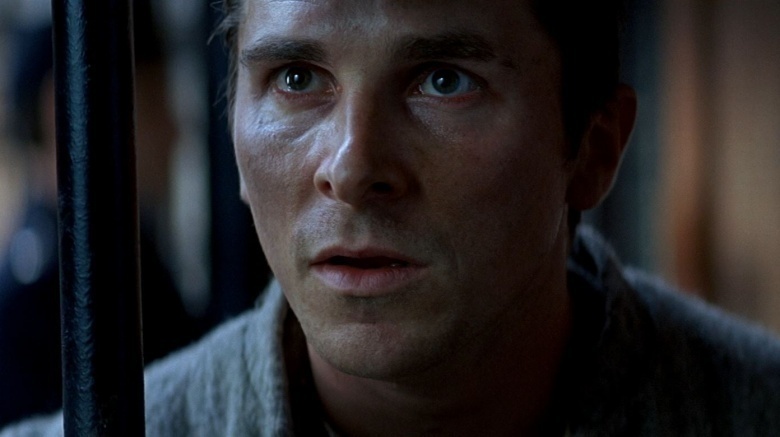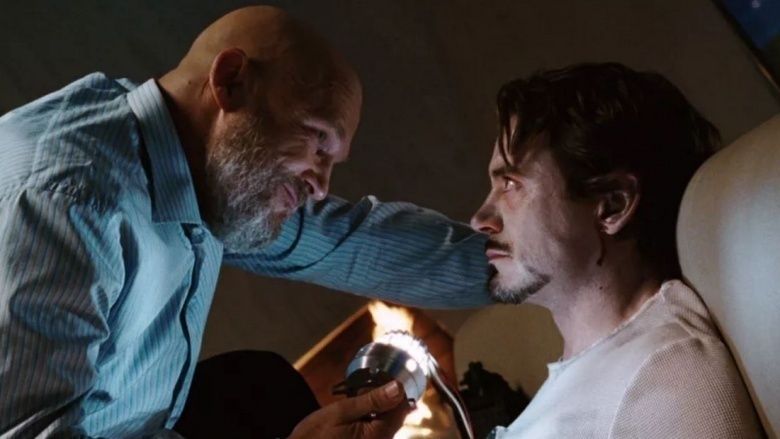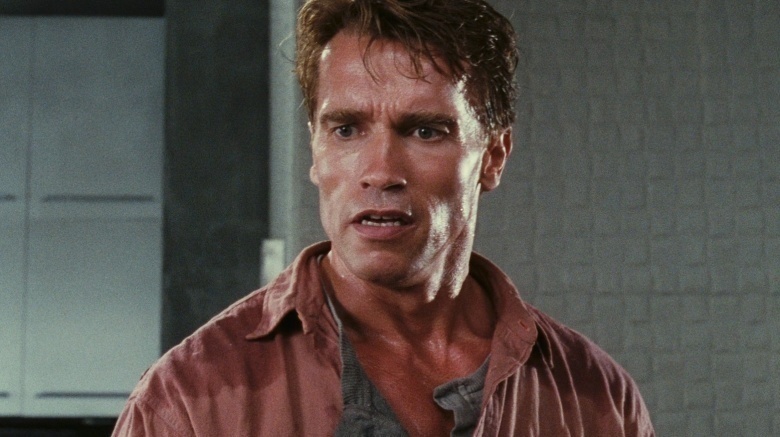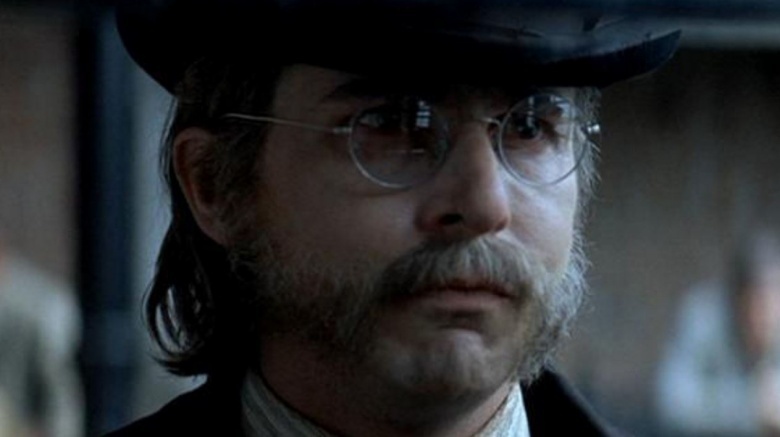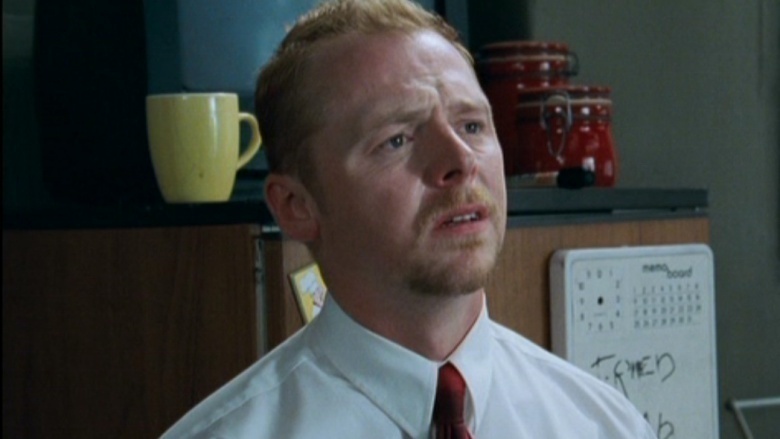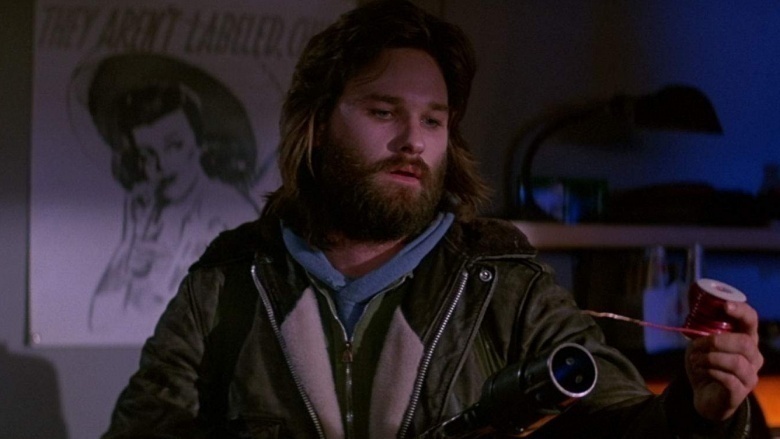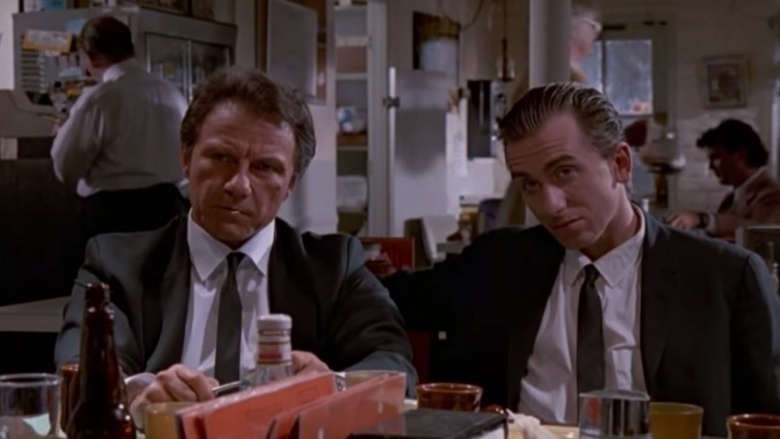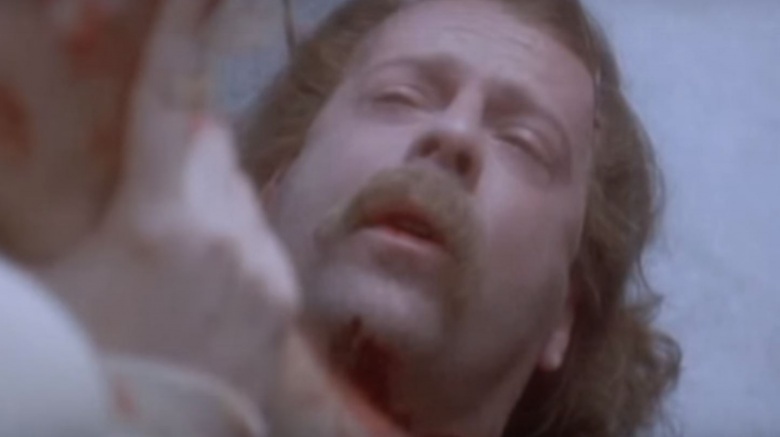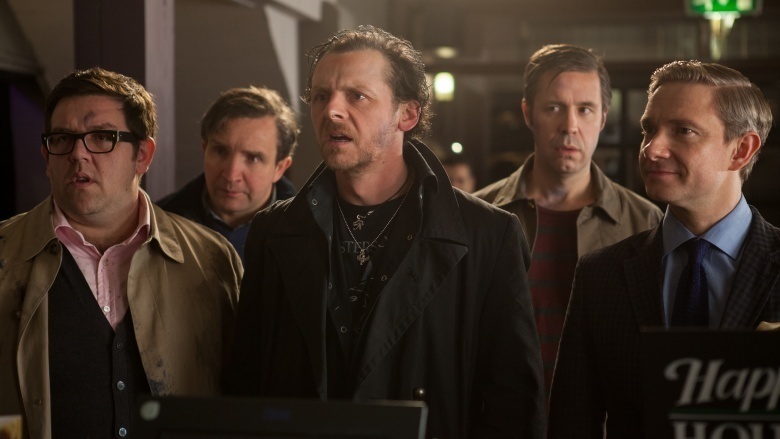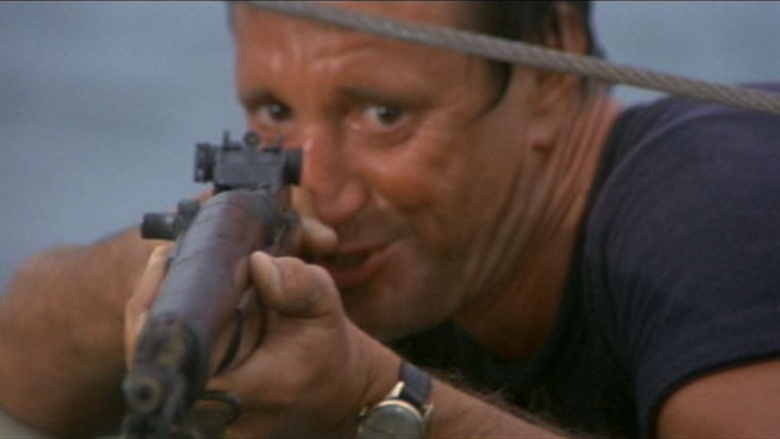Movies That Spoiled Their Own Plot Twists
There's nothing like a satisfying plot twist in a film's final act to send you reeling out of the theater—although it can be almost as satisfying to go back and watch the movie again and see all the clues you missed the first time around. Watch out for massive spoilers, because we've lined up a list of movies that spoiled their own shocking plot twists right under your nose.
Iron Man (2008)
Iron Man begins with billionaire industrialist Tony Stark's convoy being attacked by terrorists in Afghanistan. After he's captured, he's forced to film a ransom video with the terrorists—members of a group called the Ten Rings—speaking in a foreign language, making what moviegoers would believe to be some kind of financial or weapons-based demands. Stark's assistant Pepper Potts has the video translated and we learn that Obadiah Stane, longtime friend and partner of Stark's father Howard, is the bad guy calling the shots behind the scenes. It's a shock, but not to viewers fluent in Urdu, who were able to understand the terrorists' dialogue in the ransom video and hear that they were directly speaking to Stane.
Total Recall (1990)
We all love vacations. You get to take a break from work, visit an exotic location, and experience all kinds of new activities. Douglas Quaid in Total Recall is no different: he wanted to have a grand vacation, so he went to Rekall, a company that implants memories of vacations into the minds of its patrons.
Quaid chooses an espionage- and action-filled memory, ending with him saving the planet. We're led to believe the Rekall implantation procedure went horribly wrong, but after a bunch of bodies pile up and everyone on Mars almost dies, we realize Quaid has been experiencing his Rekall selections from the beginning of the film to perfection. Looks like Richter's party wasn't real after all.
The Prestige (2006)
Christopher Nolan's The Prestige tells the tale of a methodical game of cat-and-mouse between Robert "The Great Danton" Angier and Alfred "The Professor" Borden, two young rival magicians fighting for their place in the spotlight who go to great lengths to maintain the secrets of their tricks and be the better magician.
Borden's ultimate trick is that he has a twin brother he uses to pull off the charade of being teleported across the stage. Outside of the act, the twin lives as the assistant, with both brothers living half of a life as they take turns being Borden in public. Earlier in the film, a boy witnesses a bird cage trick, where the animal is secretly killed inside a collapsing cage under a sheet, but the magician brings the bird back, presumably from up his sleeve. The boy sees through the illusion, and clues the unwitting audience in to the big reveal: as Borden holds up the healthy bird, the boy looks at him and says "where's his brother?"
Shaun Of The Dead (2004)
Ed may have been a lethargic oaf through most of Shaun of the Dead, but you've got to love the guy. After Liz breaks up with Shaun, Ed takes his best friend to their favorite pub, the Winchester, and tries to reassure him that everything will be alright. Ignoring the zombie outbreak happening throughout London, Ed explains his plan in order to help Shaun get over Liz, which is a good night of barhopping.
The plan actually summarizes the entire movie's plot: he suggests they have a Bloody Mary, have a bite at the King's Head, take down a few more at the Little Princess, stagger back to the Winchester, and come back to the bar for shots. The next day, the first zombie they encounter is named Mary, Shaun's stepfather gets bitten after they try to rescue his parents, and the group encounters more zombies at Liz's house. Shaun and company act like zombies to blend in and shuffle back to the Winchester, where they grab the pub's namesake rifle from above the bar to protect themselves from zombies. Now that's a night of the living dead on the town.
The Thing (1982)
John Carpenter's Antarctic horror film, about a shapeshifting alien creature infiltrating and slowly killing off a group of men working at a research station, is unlike any of its contemporaries in the genre. The movie starts off with a sled dog being chased through the Antarctic landscape by men in a helicopter. The dog runs into the research station, and its occupants are shocked by the Norwegian man trying to kill it. Anyone fluent in Norwegian, however, understood the man's pleas—that the dog was actually an alien in disguise and that it needed to die. Everyone at the camp could have been saved if someone had Rosetta Stone or a translation book or something. This is why you should always learn the language, people.
Reservoir Dogs (1992)
Quentin Tarantino's debut is a bloody crime caper involving an undercover cop. A bunch of professional criminals rob a jewelry store, only to find a police ambush. The crime boss organizing the heist gave each of his cronies a color-themed name in order for everyone to remain anonymous in case anyone was busted, and if you watch the film knowing that Mr. Orange is the undercover cop, you'll notice a bunch of small hints, such as an ominous orange balloon following Nice Guy Eddie's car in the middle of the film.
Tarantino's biggest tease takes place during the movie's opening coffee scene, in which Mr. Orange explains to his boss that Mr. Pink didn't tip their waitress after everyone else did. The police informant was surprisingly quick to rat out his cohort, even for something as trivial as a dollar.
12 Monkeys (1995)
In 12 Monkeys, James Cole (Bruce Willis) travels 31 years back in time to prevent an apocalyptic virus from wiping out humanity. The only problem is that he's constantly haunted by a recurring dream of a running man being gunned down inside an airport. After multiple failed attempts at tracking down the source of the virus, Cole decides to give up and try to enjoy what's left of his pre-apocalypse before humanity's destroyed.
Before boarding his flight to the Florida Keys, however, he finds the man actually responsible for the virus and tries to kill him, but he's shot down by police. As he dies, he sees a little boy watching the whole thing—a boy who's actually Cole as a child. The scenes he keeps remembering are from his own death, which he witnessed as a child. Sorry Bruce, but Doc Brown would've been glad you avoided that potential rip in the space-time continuum.
The World's End (2013)
Edgar Wright is the king of clever foreshadowing, and every film in his Blood and Ice Cream trilogy is dripping with brilliant setups and payoffs. Similar to the spoilers hidden away in Shaun of the Dead, The World's End spells out its entire plot in the names of the various pubs throughout the film.
For example, when Gary King (Simon Pegg) and his buddies visit the Cross Hands, it's where they first work together to battle the robots ("blanks") who've taken over the town. When they stop by the Trusty Servant, they meet a human who's now collaborating with the alien invaders, and when they visit the Mermaid, they run into three seductive teens who try to distract them from their quest. At the Beehive, they learn how the blanks want to establish a collective utopia that does away with individuality, and after dropping by the fabled World's End, they accidentally kickstart the apocalypse.
While that's definitely a brilliant bit of writing, there's actually some far subtler foreshadowing happening earlier in the film. After Gary reunites with his four childhood friends for their epic pub crawl, he excitedly declares they're like the five musketeers. But then one of Gary's buddies, Oliver Chamberlain (Martin Freeman), responds with the question, "Don't you mean the three musketeers?"
Sure, Oliver might know a thing or two about French literature, but he's also telling us exactly how many of our protagonists are going to survive the film. By the climax, two of the friends are dead, assimilated by the Network, reducing the five musketeers to three. And unfortunately for Oliver, he's one of the guys who winds up spurting blue blood.
The Hateful Eight (2015)
In the violent world of Quentin Tarantino's movies, any character might die at any moment, but that's especially true for The Hateful Eight. While we don't want to give away every death in this Grand Guignol of a western, we have to talk about the awful fate that befalls Daisy Domergue (Jennifer Jason Leigh).
An outlaw with a fondness for guitars and racial slurs, Domergue is a murderer who finds herself in the clutches of John "The Hangman" Ruth (Kurt Russell), a bearded bounty hunter who never kills his victims. Instead, as Major Marquis Warren (Samuel L. Jackson) explains to Domergue, "When the handbill says 'dead or alive,' the rest of us just shoot you in the back from up on top a perch somewhere and bring you in dead over a saddle. But when John Ruth the Hangman catches you, you hang!"
Warren might as well be a fortune teller because that's exactly what happens...but not in the way the audience expects. Thanks to a lot of backstabbing (and back-shooting), Domergue is eventually lynched by Major Warren and a bushwhacker-turned-sheriff named Chris Mannix (Walton Goggins). It's one of the grisliest scenes in the entire Tarantino filmography, and it was predicted not only by Major Warren but also Oswaldo Mobray (Tim Roth), an English executioner who lectures Domergue on the differences between justice and "frontier justice."
According to Mobray, Domergue needs to be tried, and if she's found guilty, he'll perform a legal execution. That's justice. But if an angry mob were to skip the trial, well, that's frontier justice. Mobray describes lynching as "very thirst quenching," although it's apt to be wrong as right. And whether or not Domergue deserves to hang, she probably did deserve a trial before Warren and Mannix invited her to a necktie party.
Jaws (1975)
The film that put Steven Spielberg on the map, Jaws revolutionized Hollywood and ruined the beach for everyone. It also has one of the most explosive climaxes of all time (pun intended). Alone on a sinking boat, Sheriff Martin Brody (Roy Scheider) is face-to-face with a monster great white. As the shark approaches, Brody tosses a scuba tank into the animal's jaws. Then, using a rifle, Brody shoots the tank and blows the shark into a million bloody bits.
True, a scuba tank probably wouldn't explode like that in real life, but it's a great scene nonetheless. The moment is also set up several times earlier in the film. The first spoiler appears when Brody is paging through a book on sharks, educating himself on the toothy killer prowling around his town. During his research, Brody glimpses a photo of a shark biting down on a long metallic cylinder. According to the blog "The Haunted Closet," that's "an aluminum rod used to measure bite strength in tons," and it establishes the idea that sharks have a thing for chomping down on metal cylinders.
The second spoiler comes when Brody teams up with scientist Matt Hooper (Richard Dreyfuss) and fisherman Captain Quint (Robert Shaw). After the protagonists set sail to kill the shark, Brody accidentally loosens a knot and sends several compressed air tanks rolling across the deck. Panicked, Hooper shouts at Brody, "You screw around with these tanks, and they're going to blow up!"
It's a lesson Brody learns well, but the spoilers aren't finished yet. Seconds later, an irritated Quint comments, "That's real fine expensive gear you've brought here, Mr. Hooper. But I don't know what that b****** shark is going to do with it. Might eat it, I suppose."
Why, yes, Quint. You're 100% right.
L.A. Confidential (1997)
Based on a novel by James Ellroy, L.A. Confidential is widely considered one of the all-time great detective films. Roger Ebert included it in his Great Movie collection, the Library of Congress selected it for the National Film Registry, and at the 70th Academy Awards, the film snagged two Oscars. One of those awards went to Brian Helgeland and Curtis Hanson for Best Adapted Screenplay, and their script for this neo-noir is incredibly tight, complete with a clever little spoiler hidden in the early scenes of the film.
It all revolves around Sgt. Edmund "Ed" Exley (Guy Pearce), a spectacles-sporting police officer with big ambitions. He's described as a "political animal," and he certainly knows how to play the system. But while he's a schemer, he still clings to a certain moral code, believing police officers are supposed to protect the law, not break it. However, that's not exactly how things work in this 1950s police department. The L.A. cops bend as many rules as they enforce, so it's no surprise that Captain Dudley Smith (James Cromwell) thinks Exley isn't cut out for the job.
Hoping to curb Exley's dream of becoming a detective, Smith asks the young sergeant a series of cutting questions. Would he be willing to plant evidence on a suspect? Would he beat a confession out of someone he "knew" was guilty? Most importantly, could he shoot a "hardened criminal in the back?" Exley responds to each question with an adamant "no," but by the end of the film, Exley does indeed beat a suspect and, in the final shoot-out, plugs a bad guy in the back.
Ironically, that bad guy is Captain Dudley Smith.
Hot Fuzz (2007)
Once again, we're returning to the Edgar Wright oeuvre. After all, there are so many layers to his movies that it takes multiple viewings to get all the gags, and that's especially true for Hot Fuzz.
For example, there's the moment when DS Andy Wainwright (Paddy Considine) confronts Sgt. Nicholas Angel (Simon Pegg) in a pub. Thinking the self-righteous Angel can't wait to replace a recently "retired" officer, Wainwright cracks, "I bet you can't wait to jump into Sgt. Popwell's grave." Angel tersely replies, "I'm not jumping into anyone's grave." But later in the film, Angel literally falls into the murdered policeman's tomb.
Another quick spoiler appears during a carnival scene, when Angel is approached by a local reporter (Adam Buxton) who knows the identity of a serial killer. But before he can reveal the name, the journalist is murdered in spectacularly bloody fashion. Of course, we could've guessed this was coming as moments before, we saw the suspected murderer (Timothy Dalton) promoting a carnival game called "Splat the Rat."
But really, the best spoiler comes in the first five minutes of the movie. Feeling threatened by Angel's excellent police work, his superiors decide to send him to a quiet country town where he'll never be heard from again. Naturally, Angel protests this decision, but the police chief (Bill Nighy) explains he's sending Nicholas away whether he likes it or not.
Furious, Angel tells his boss he can't just make people disappear, to which his commander responds, "Yes, I can. I'm the chief inspector." And that, right there, is the whole plot. When Angel finally arrives at the quiet village of Sandford, he discovers the town is run by a cult-like group that murders anyone ruining Sandford's perfect image. The bodies are then hidden away, stories are concocted to explain the disappearances, and of course, the psychotic gang is run by none other than the town's chief inspector (Jim Broadbent).
